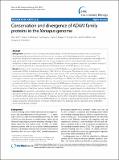| dc.contributor.author | Wei, Shuo | |
| dc.contributor.author | Xu, Guofeng | |
| dc.contributor.author | Bridges, Lance C. | |
| dc.contributor.author | Shah, Anoop | |
| dc.contributor.author | White, Judith M. | |
| dc.contributor.author | DeSimone, Douglas W. | |
| dc.contributor.author | Whittaker, Charles A. | |
| dc.date.accessioned | 2012-03-09T19:54:55Z | |
| dc.date.available | 2012-03-09T19:54:55Z | |
| dc.date.issued | 2010-07 | |
| dc.date.submitted | 2010-02 | |
| dc.identifier.issn | 1471-2148 | |
| dc.identifier.uri | http://hdl.handle.net/1721.1/69637 | |
| dc.description.abstract | Background
Members of the disintegrin metalloproteinase (ADAM) family play important roles in cellular and developmental processes through their functions as proteases and/or binding partners for other proteins. The amphibian Xenopus has long been used as a model for early vertebrate development, but genome-wide analyses for large gene families were not possible until the recent completion of the X. tropicalis genome sequence and the availability of large scale expression sequence tag (EST) databases. In this study we carried out a systematic analysis of the X. tropicalis genome and uncovered several interesting features of ADAM genes in this species.
Results
Based on the X. tropicalis genome sequence and EST databases, we identified Xenopus orthologues of mammalian ADAMs and obtained full-length cDNA clones for these genes. The deduced protein sequences, synteny and exon-intron boundaries are conserved between most human and X. tropicalis orthologues. The alternative splicing patterns of certain Xenopus ADAM genes, such as adams 22 and 28, are similar to those of their mammalian orthologues. However, we were unable to identify an orthologue for ADAM7 or 8. The Xenopus orthologue of ADAM15, an active metalloproteinase in mammals, does not contain the conserved zinc-binding motif and is hence considered proteolytically inactive. We also found evidence for gain of ADAM genes in Xenopus as compared to other species. There is a homologue of ADAM10 in Xenopus that is missing in most mammals. Furthermore, a single scaffold of X. tropicalis genome contains four genes encoding ADAM28 homologues, suggesting genome duplication in this region.
Conclusions
Our genome-wide analysis of ADAM genes in X. tropicalis revealed both conservation and evolutionary divergence of these genes in this amphibian species. On the one hand, all ADAMs implicated in normal development and health in other species are conserved in X. tropicalis. On the other hand, some ADAM genes and ADAM protease activities are absent, while other novel ADAM proteins in this species are predicted by this study. The conservation and unique divergence of ADAM genes in Xenopus probably reflect the particular selective pressures these amphibian species faced during evolution. | en_US |
| dc.description.sponsorship | National Institutes of Health. Department of Health and Human Services (Ruth L. Kirschstein postdoctoral fellowship) | en_US |
| dc.description.sponsorship | National Institutes of Health. Department of Health and Human Services (5T32GA09109) | en_US |
| dc.description.sponsorship | American Heart Association (postdoctoral fellowship) | en_US |
| dc.description.sponsorship | March of Dimes Birth Defects Foundation (grant 1-FY10-399) | en_US |
| dc.description.sponsorship | March of Dimes Birth Defects Foundation (grant F405-140) | en_US |
| dc.description.sponsorship | National Institutes of Health (U.S.) (HD26402) | en_US |
| dc.description.sponsorship | National Institutes of Health (U.S.) (DE14365) | en_US |
| dc.language.iso | en_US | |
| dc.publisher | Springer (Biomed Central Ltd.) | en_US |
| dc.relation.isversionof | http://dx.doi.org/10.1186/1471-2148-10-211 | en_US |
| dc.rights | Creative Commons Attribution | en_US |
| dc.rights.uri | http://creativecommons.org/licenses/by/2.0 | en_US |
| dc.source | BioMed Central | en_US |
| dc.title | Conservation and divergence of ADAM family proteins in the Xenopus genome | en_US |
| dc.type | Article | en_US |
| dc.identifier.citation | Wei, Shuo et al. “Conservation and Divergence of ADAM Family Proteins in the Xenopus Genome.” BMC Evolutionary Biology 10.1 (2010): 211. Web. 9 Mar. 2012. | en_US |
| dc.contributor.department | Koch Institute for Integrative Cancer Research at MIT | en_US |
| dc.contributor.approver | Whittaker, Charles A. | |
| dc.contributor.mitauthor | Whittaker, Charles A. | |
| dc.relation.journal | BMC Evolutionary Biology | en_US |
| dc.eprint.version | Final published version | en_US |
| dc.type.uri | http://purl.org/eprint/type/JournalArticle | en_US |
| eprint.status | http://purl.org/eprint/status/PeerReviewed | en_US |
| dspace.orderedauthors | Wei, Shuo; Whittaker, Charles A; Xu, Guofeng; Bridges, Lance C; Shah, Anoop; White, Judith M; DeSimone, Douglas W | en |
| mit.license | PUBLISHER_CC | en_US |
| mit.metadata.status | Complete | |

